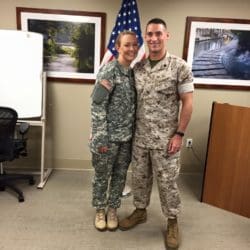At what moment did you realize you were a military caregiver?
At the time I was an active-duty nurse, but even I didn’t realize the extent of my husband’s brain injury. In July 2014, Matthew had a series of seizures that led to cardiac arrest. I was there for his second seizure and I can still visualize checking for his pulse. As a trauma nurse, I thought I was watching my husband die in front of me.
What is your current challenge as a caregiver?
I still focus on what’s best for my husband. He is only 31 and he wants to have a career and be a productive member of society. I spend a lot of time researching different programs for him, but it often feels as if everything is a fight.
What advice do you wish you had when you first became a military caregiver?
Get copies of everything! And ideally, from day one, you would realize that you are not alone and that there are organizations and support communities that will welcome you.

My Story
Helen's husband, Matt, was struck by three improvised explosive device (IED) blasts on the same day while serving as a Marine in Afghanistan. At first, he assumed he was lucky not to lose any limbs. Five years later, however, he suffered a series of grand-mal seizures that left him unresponsive. He emerged from intensive care with a ten-year memory loss and issues speaking. He was eventually diagnosed with post-traumatic epilepsy.
Helen spent five years as an Army nurse and before entering the Reserves, she spent two years working at Walter Reed National Military Medical Center. After Matt's injury, Helen chose to leave active duty and pursue graduate school as an acute care nurse practitioner at Georgetown University. In 2017, Helen joined Global Response Management, providing life-saving emergency and prehospital care to those impacted by war and conflict. Helen advocates for children everyday, working to find them the best care possible. She has provided aid to civilians in Mosul, Iraq and the Rohingya refugees in Cox Bazar, Bangladesh. She now serves as the Executive Director and continues to work in areas like the Bahamas, along the US-Mexico border, and wherever she is needed.
Both Helen and Matt have experiences the challenges of military life, surviving a difficult time managing Matt's injuries, while Helen pursued her career. The added pressures were difficult, they have worked through them. Now, they find themselves as parents, sharing that love with their new baby boy, Ethan. Together, Helen and Matt's love is spread worldwide. Helen uses her platform as a Dole Fellow to advocate for dual-military families and bring attention to their unique concerns.










